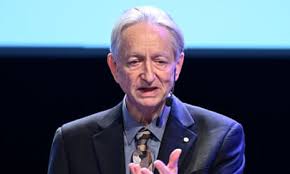Geoffrey Hinton: The Godfather of Artificial Intelligence

Introduction
Geoffrey Hinton, a pioneer in artificial intelligence, has been a pivotal figure in the development of neural networks. His contributions have transformed how machines learn and understand data. As AI technology becomes increasingly integrated into everyday life, Hinton’s work and insights are more relevant than ever, especially in light of recent advancements and debates around AI ethics and deployment.
His Contributions to AI
Born in 1947 in Wimbledon, England, Hinton’s journey in the field of AI began at the University of Edinburgh, where he completed his PhD in 1978. He later moved to the University of Toronto, where he and his team made groundbreaking progress in deep learning. In 2012, Hinton led a team that developed a neural network that won a prestigious image recognition competition, marking a significant milestone in AI.
Hinton’s innovative approach to deep learning using multilayer neural networks has laid the foundation for many modern AI applications, including natural language processing, image recognition, and autonomous systems. His work received further validation in 2018 when he was awarded the ACM A.M. Turing Award, often considered the “Nobel Prize” of computer science, alongside his colleagues Yann LeCun and Yoshua Bengio.
Recent Developments
Recently, Hinton has expressed concerns about the potential dangers of AI technology. In interviews, he has highlighted the risks associated with advanced AI systems, including bias, misinformation, and the possible loss of jobs due to automation. His warnings come at a time when powerful AI models are being released at unprecedented speeds, prompting discussions around regulatory measures and ethical standards for AI development and use.
In May 2023, Hinton made headlines when he announced his decision to leave Google, where he had worked for over a decade, to speak more freely about the existential risks posed by AI. His departure underscores the ongoing tension between technological advancement and ethical responsibility.
Conclusion
As we navigate the future of artificial intelligence, Geoffrey Hinton remains a crucial voice in the conversation about its implications for society. His pioneering work has not only shaped the technology we use today but also raised important questions about its future trajectory. As AI continues to evolve, Hinton’s insights will be invaluable in guiding ethical considerations and ensuring that AI serves humanity positively. The significance of his contributions and current perspectives are likely to influence the next generation of researchers and policymakers alike.









